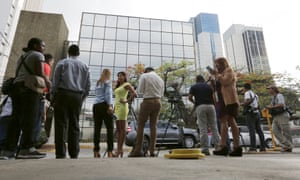Revelations about the tax affairs of David Cameron’s late father are a sideshow in the Panama Papers saga, diverting attention from an offshore heist that has seen billions of dollars siphoned out of Africa.
For 15 years, the continent’s vast wealth of natural resources have been a magnet for foreign investment, much of which has been channelled through offshore centres including the British Virgin Islands.
Huge fortunes have been made but the benefits have bypassed ordinary Africans, with money that could have been used for schools, health clinics and infrastructure disappearing through a warren of offshore accounts.
What the Mossack Fonseca leak has done is shine a light on the secret world that has made it all possible – a world where the boundaries between legitimate business and illicit finance have become increasingly blurred.
Consider the case of Beny Steinmetz, a prominent name in the Panama Papers. In 2008, Steinmetz’s British Virgin Islands registered company, BSG Resources (BSGR), secured rights to a 50% stake in Guinea’s Simandou mine – one of the world’s richest iron ore deposits in one of the world’s poorest countries.
BSGR said it had acquired the stake on the promise of a $165m investment in the exploration of the area with “no guarantee of success”. But two years later it sold half of the stake to the Brazilian mining giant Vale for $2.5bn – a sum equivalent to roughly twice Guinea’s annual budget.
The Sudanese philanthropist, Mo Ibrahim, described the Guinean deal brokers as “idiots, or criminals, or both”.
The deal was negotiated under the rule of authoritarian president Lansana Conte. After his death in 2008 the country’s first democratically-elected government launched an investigationwhich claimed to discover “precise and coherent evidence” that BSGR had used intermediaries to pay bribes to Conte’s wife, through another British Virgin Islands registered company.
Authorities in the US are also investigating the corruption charges. Steinmetz denies payingany bribes or wrongdoing – but the lack of transparency among the British Virgin Island registered companies has obstructed a full investigation.
Another name listed in the Panama Papers is that of Dan Gertler, who has close ties to the president of the Democratic Republic of Congo, Joseph Kabila.
Two years ago the Africa Progress Panel (APP), headed by former UN Secretary-General Kofi Annan and anti-corruption group Global Witness, investigated five major mineral mining concession sales involving Gertler’s companies.
In each case, the companies secured the concessions at prices well below what the APP estimates to be credible market rates. The deals, which took place between 2010 and 2012, were estimated to have cost the state $1.4bn in revenue – almost double the combined annual budget for health and education in a country with one of the world’s highest child mortality rates and 7 million children out of school.
No credible account has been provided to explain why valuable assets were transferred on the cheap, but it is offshore secrecy that makes it impossible to determine whether DRC’s political leaders were ever beneficiaries of Gertler’s companies.
Gertler disputes the accusations and has said that his offshore companies are solely for the benefit of his family.
‘Tax planning’
Some of the companies named in the Panama Papers have used offshore centres for “aggressive tax planning” – a euphemism in some cases for outright avoidance.
This includes accountants operating for Heritage Oil and Gas, who according to the BBC were seeking to avoid paying $400m in capital gains tax to Uganda by moving the company’s registration from the Bahamas to Mauritius – which doesn’t levy the tax.
Heritage insists that the move was part of a “re-domiciling” of a subsidiary that began long before any tax dispute with Uganda.
African elites
Although not directly linked to the Panama Papers there is also evidence that corrupt African elites have used offshore opportunities to stash public money. In 2014, for example, senior Tanzanian political figures and foreign businessmen were accused of shifting $120m from the state’s energy provider Tanesco to offshore bank accounts.
The scandal prompted international donors to withhold aid and four national politicians to resign.
Then there’s the case of Teodorin Obiang, the son of Equatorial Guinea’s president and the country’s education minister. At a time when the younger Obiang had a reported salary of $100,000, he used offshore companies to purchase a $30m mansion in Malibu, a fleet of luxury cars, a jet, and $3m worth of Michael Jackson memorabilia – including the original Thriller glove.
In 2001 Obiang was investigated by the FBI which accused him of buying the luxury items with looted money and was ordered hand back $30m of assets to Equatorial Guinea – although he got to keep the glove.
Questions raised
The Panama Papers have raised other questions that deserve answers. Why did the Rwandan government establish an offshore company to lease aeroplanes for its leaders?
And why is the second highest ranking judge in Kenya linked to at least 11 companies listed in the British Virgin Islands?
Not all offshore activity is harmful to Africa’s interests but the absence of transparency blurs the lines between legitimate and illicit activity.
Next month Cameron will host an anti-corruption summit in the UK. What better opportunity to galvanise action? It is time to draw back the cloak of secrecy and demand that offshore territories linked to the UK establish full public registries.
Africa has plenty of homegrown corruption problems that need national solutions, but the Panama Papers have turned the spotlight on an international problem that demands international action.
A version of this article first appeared on the Overseas Development Institute

